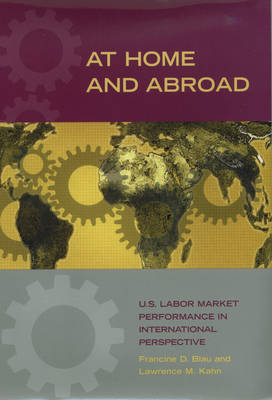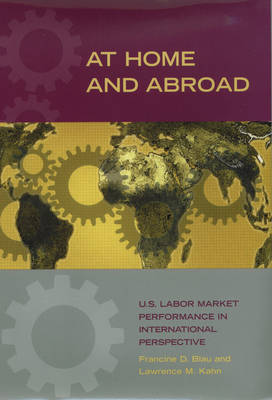
- Afhalen na 1 uur in een winkel met voorraad
- Gratis thuislevering in België vanaf € 30
- Ruim aanbod met 7 miljoen producten
- Afhalen na 1 uur in een winkel met voorraad
- Gratis thuislevering in België vanaf € 30
- Ruim aanbod met 7 miljoen producten
Zoeken
At Home and Abroad
U.S. Labor-Market Performance in International Perspective
Francine D Blau, Lawerence M Kahn
Paperback | Engels
€ 57,95
+ 115 punten
Omschrijving
Throughout the latter part of the 20th century, the U.S. labor market performed differently than the labor markets of the world's other advanced industrialized societies. In the early 1970s, the United States had higher unemployment rates than its Western European counterparts. But after two oil crises, rapid technological change, and globalization rocked the world's economies, unemployment fell in the United States, while increasing dramatically in other nations. At the same time, wage inequality widened more in the United States than in Europe. In At Home and Abroad, Cornell University economists Francine D. Blau and Lawrence M. Kahn examine the reasons for these striking dissimilarities between the United States and its economic allies. Comparing countries, the authors find that governments and unions play a far greater role in the labor market in Europe than they do in the United States. It is much more difficult to lay off workers in Europe than in the United States, unemployment insurance is more generous in Europe, and many fewer Americans than Europeans are covered by collective bargaining agreements. Interventionist labor market institutions in Europe compress wages, thus contributing to the lower levels of wage inequality in the European Union than in the United States. Using a unique blend of microeconomic and microeconomic analyses, the authors assess how these differences affect wage and unemployment levels. In a lucid narrative, they present ample evidence that, as upheavals shook the global economy, the flexible U.S. market let wages adjust so that jobs could be maintained, while more rigid European economies maintained wages at the cost of losing jobs. By helping readers understand the relationship between different economic responses and outcomes, At Home and Abroad makes an invaluable contribution to the continuing debate about the role institutions can and should play in creating jobs and maintaining living standards.
Specificaties
Betrokkenen
- Auteur(s):
- Uitgeverij:
Inhoud
- Aantal bladzijden:
- 326
- Taal:
- Engels
Eigenschappen
- Productcode (EAN):
- 9780871540829
- Verschijningsdatum:
- 5/04/2007
- Uitvoering:
- Paperback
- Formaat:
- Trade paperback (VS)
- Afmetingen:
- 159 mm x 226 mm
- Gewicht:
- 453 g

Alleen bij Standaard Boekhandel
+ 115 punten op je klantenkaart van Standaard Boekhandel
Beoordelingen
We publiceren alleen reviews die voldoen aan de voorwaarden voor reviews. Bekijk onze voorwaarden voor reviews.











